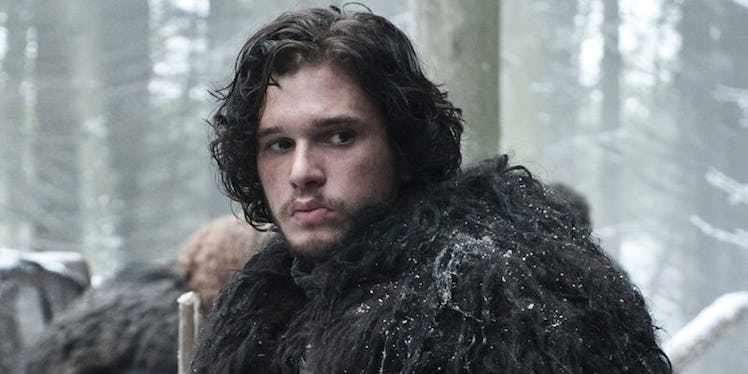
'GOT' Finale Reveals The Double-Edge Sword Of Staying True To Yourself
Warning: Spoilers are revealed throughout this article.
It was the very first harsh reality "Game Of Thrones" taught us, yet we still inherently want to believe it's not true.
If you abide by your moral compass, by the genuine conducts of your character, you’re simply not going to make it very far in this world populated by dragons, White Walkers and Cersei Lannister.
Let’s circumvent to 2011, where, in a seemingly much simpler time, Ned Stark stood beside his children and made them watch as he decapitated a Night’s Watch deserter.
“The man who passes the sentence should swing the sword,” he says to young, wide-eyed Bran (who has yet to go through puberty and cause production problems for the show).
Ned hears the deserter out, listens to his final plea, but the Starks are a people of tradition, honor and dignity.
They are a family who will abide by these values no matter who is on the Iron Throne, for better or worse.
Unfortunately, it’s a lesson that stuck a little too well, and as we’ve seen time and time again, the stubborn veracity of the Stark family tends to frequently lead to their demise.
But, Jon Snow wasn’t the only one at fault for being true to his nature last night.
The season five finale was all about the genuineness of character, and how it frequently can get us into trouble (or, in Westeros, killed).
“Do your duty,” mutters Stannis Baratheon, moments before his death.
Here is a man whose unwillingness to compromise led to mistake after mistake, and now, mangled and dying, he talks of duty.
He doesn’t repent for burning his daughter alive; he doesn’t mourn the loss of his wife to suicide.
He speaks of duty because that is who Stannis Baratheon is, who he always has been and who he always will be.
Take Arya, who, despite her months of teachings, can’t bring herself to shed the vengeful roots this series has delicately flowered since her time in King’s Landing.
She reveals her name; she acts on impulse and character.
Meanwhile, Cersei rids herself of her pride and, quite literally, flaunts her vulnerabilities for the world to see.
Because, at her core, she is a mother. Underneath all of her seemingly evil decisions is an inherent instinct to simply protect her children.
Even Reek, submissive and broken, reverts back to Theon for a split second in what is, perhaps, the only sigh of relief we viewers got in the entirety of the hour.
And, finally, we have Jon Snow, the man who has been cut, shot at and stabbed more times in this series than anyone deserves; the man who has participated in more action sequences than the rest of the cast combined.
Truly a son of his father, Jon simply can’t rid himself of the honor that got both Ned and Robb killed.
He acts upon his moral compass, upon his tenacity to truly be the shield that guards the realms of men.
Unfortunately, his fellow brothers aren’t thinking about the realms of men anymore.
They’re thinking about food, winter and death.
Even non-readers must have seen this Julius Caesar moment from miles away.
It’s a scene that had been telegraphed by the writers throughout the entire season, from Jon’s unsatisfying pep talk with Olly to Alliser Thorne’s less-than-obvious forewarnings.
“You have a good heart, Jon Snow,” Thorne says as the Wildings shuffled through the gate last week, “It’s going to get us all killed.”
Jon Snow got so wrapped up in being a good human being, he forgot to be a good leader.
And, when the group you’re leading is a raggedy group of rapists, murderers and thieves, that notion can get dangerous rather quickly.
This lesson is exactly what makes "Game of Thrones" so addicting.
We all can relate to following our moral compasses a little too closely.
We know that, even in a non-fantastical realm, the right move and the correct move almost never intersect.
It’s these very truisms that allow us to invest in characters preoccupied with zombies and evil ice creatures.
And so, even with the incredibly apparent knowledge that Jon Snow was losing the faith of The Night’s Watch, we audience members still sincerely hoped something would miraculously work itself out.
Because, unlike Stannis or Cersei, we morally agreed with Jon.
We saw the personal sacrifice he made with Ygritte (at least he didn’t die a virgin, right?).
We were with him when he selflessly attempted to kill Mance Rayder last season.
We were with him at Hardhome, where we watched thousands of fellow men get turned into mutilated human rag dolls.
But, we were also with Ned when he refused to swear fealty to Joffrey.
We were with Robb when he impulsively acted on affection as opposed to politics.
And, as this show has proven time and time again, if you act in accordance with your gut, you’ll eventually be getting a dagger there.
So, in a finale of characters acting in accordance with their natures, it’s only fitting Jon Snow ends with his.
In a repetitive lesson about being honorable and truthful to a fault, "Game of Thrones" has lost another one of its rare flagships of morality.
And our shock is proof that we, like Jon, knew nothing the entire time.